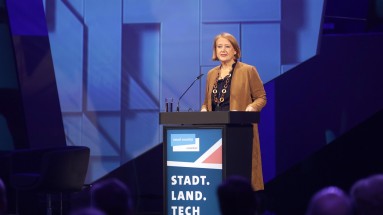Page content
Taking everyone on the digital journey

Lisa Paus, Federal Minister for Family Affairs, Senior Citizens, Women and Youth, recalled the first steam locomotive rides. Of the fear many people had of this technology back then. “Today, some people are worried that the digitalization train could leave without them.” Taking everyone along on the digital journey was the focus of her keynote speech and the subsequent panel “Digital for all: How do we strengthen inclusion, participation and accessibility?” at the Smart Country Convention.
The Green politician said that she could certainly understand the fear. She focused on older people, who make up around a quarter of the population at 20 million. “People who are 60 today grew up with public telephone boxes, typewriters and the Wuermeling rail pass.” The technological development is rapid. “We are creating and shaping the digital space,” said Paus. That is why it is the joint task of the federal, state and local governments to ensure that no one is left behind.
One in ten baby boomers is offline
After all, Paus cited statistics showing that 30 percent of today's 68 to 77-year-olds are offline, compared to 55 percent of even older people (and ten percent of baby boomers). And even being online does not mean having digital skills. It is often a question of unequal conditions: Older, female, low income and education, with disabilities, chronically ill, migration background - “the more of these characteristics are combined in a person, the more likely they are to be offline,” explained the minister.
Michael Groß, President of the AWO Federal Association, reported on many people who are unable to participate in everyday digital life because they lack the technical equipment and simply the money. He called for corresponding legal entitlements in the German Social Code, more money for digital equipment in transfer payments and social tariffs for internet providers. Services that support older people or people with disabilities on site with digital issues should be financed on a permanent basis.
Ten million people rely on plain language
The topic of accessibility is close to the heart of Vanessa Theel, founder and CEO of SUMM AI. Her start-up develops AI that automatically translates texts into plain language. “More than ten million people in Germany rely on this form of language to understand things, obtain information and thus be able to act independently,” said Theel. She suggests integrating the topic into the training of developers.
For her, true digital participation only exists when a wildly diverse group of people are equipped with smartphones and everyone can use them to apply for an ID card, read the news, choose insurance and book a train ticket, for example. Only then will everyone be on the same train.
Become an exhibitor at #SCCON25
As a driving force for the future of digital administration and for equal digital living and working conditions in cities and rural areas, the Smart Country Convention is a must for all stakeholders who actively advance the digital transformation. Are you interested in advancing the digitization of our cities and municipalities too? Join us and position your company or municipality as an expert in digitalization in the public sector.



